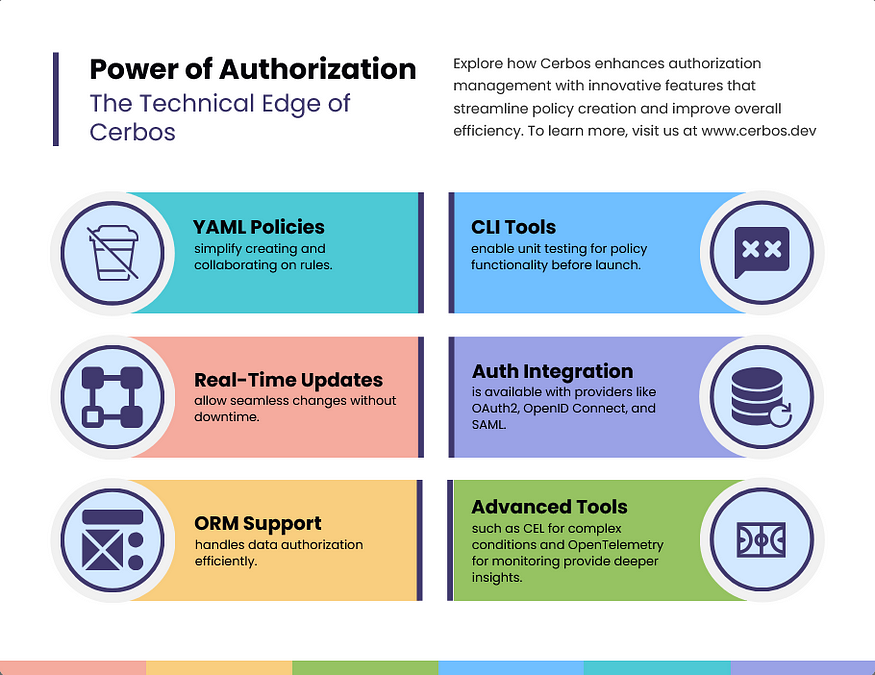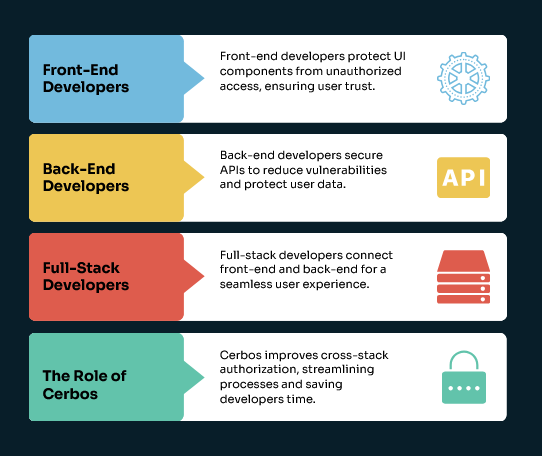Authorization is the cornerstone of secure software applications. It ensures that users can access only the resources and functionalities they are permitted to, safeguarding sensitive data and critical operations. As applications scale and evolve, authorization becomes increasingly complex, especially in environments with distributed systems and microservices. Developers often face challenges such as managing intricate access rules, ensuring compliance with regulatory standards, and maintaining a robust yet flexible authorization layer. Traditional approaches, such as hardcoding authorization logic, are not only time-consuming but also error-prone and difficult to scale. These limitations highlight the need for a modern solution that simplifies and streamlines authorization management.
Cerbos addresses these challenges with its innovative approach to authorization. It provides a comprehensive solution that empowers developers to implement fine-grained, context-aware access control policies with ease. Cerbos offers two key products: the Cerbos Policy Decision Point (PDP), an open-source tool that serves as the core for implementing scalable authorization, and the Cerbos Hub, an enterprise solution designed for centralized policy management and advanced features. By externalizing authorization logic and adopting a policy-as-code methodology, Cerbos simplifies the development process, enhances security, and ensures scalability. This approach enables organizations to save significant development time, adapt to evolving requirements, and maintain a high standard of compliance and security.
The Evolution of Authorization
Authorization has historically been implemented through hardcoded methods, where access control rules are tightly coupled with the application code. While this approach may suffice for small-scale applications, it presents significant challenges as systems grow in complexity. Hardcoded authorization methods are inflexible, making it difficult to update policies or adapt to new requirements without extensive code changes. This rigidity also creates a maintenance burden, as developers must continuously refactor code to reflect evolving access rules. Additionally, hardcoded solutions lack centralized visibility, complicating efforts to ensure security and compliance. In distributed systems or applications with microservices, these challenges multiply, leading to inconsistencies and an increased risk of errors.
In today’s rapidly evolving software landscape, authorization systems must be dynamic and capable of enforcing fine-grained access control. Applications now require context-aware decision-making that considers factors like user roles, resource attributes, and the conditions under which access is requested. Furthermore, the rise of microservices and distributed architectures demands an authorization system that seamlessly integrates across diverse components while maintaining consistency. Scalability and adaptability are no longer optional — they are critical to ensuring that the system can handle increasing user loads, evolving business requirements, and stringent regulatory standards.

Cerbos bridges the gap between traditional methods and modern needs with its stateless, policy-as-code approach. By externalizing authorization logic into a dedicated service, Cerbos decouples access control from application code, ensuring scalability and ease of maintenance. Policies are defined using an intuitive YAML configuration language, allowing developers and non-technical stakeholders to collaboratively manage access rules. Cerbos is designed to operate as a lightweight, stateless microservice that can scale alongside the application. Its compatibility with modern architectures and deployment methods ensures that it can integrate seamlessly into diverse ecosystems, providing organizations with a secure, adaptable, and developer-friendly solution to authorization.
The Technical Edge of Cerbos

Cerbos streamlines the process of implementing fine-grained authorization through an intuitive and efficient workflow. Policies are authored in a simple, human-readable YAML format, making it easy for developers and non-technical stakeholders to define access rules collaboratively. These policies can be tested using the Cerbos Command Line Interface (CLI), which supports unit tests to validate correctness before deployment. The integration of GitOps practices ensures that all policy updates are version-controlled, reviewed, and seamlessly deployed to production. Real-time updates allow changes to be propagated instantly across the system without requiring downtime or redeployment, ensuring that authorization rules remain current and effective.
Cerbos is designed to fit effortlessly into diverse application ecosystems. Its compatibility with a wide range of authentication providers enables it to integrate seamlessly with existing identity systems, such as OAuth2, OpenID Connect, and SAML-based solutions. Beyond authentication, Cerbos enhances data-level authorization by working directly with ORM frameworks like Prisma and SQLAlchemy. This integration simplifies the implementation of data-aware policies, allowing developers to filter records based on access rules dynamically. By supporting these critical touchpoints, Cerbos minimizes the overhead of adapting to existing systems while maximizing its utility in complex application stacks.
Cerbos incorporates powerful tools to support robust policy logic and system observability. It leverages Google’s Common Expression Language (CEL) to define and evaluate complex conditions within policies. CEL provides developers with a rich set of logical operators and functions, enabling precise control over authorization decisions. For observability, Cerbos integrates with OpenTelemetry, allowing DevOps teams to monitor authorization performance and diagnose issues through distributed tracing. By exposing Prometheus metrics, Cerbos provides actionable insights into system behavior, helping teams maintain optimal performance and address bottlenecks proactively. These advanced tools ensure that Cerbos not only delivers precise and reliable authorization but also supports a comprehensive view of system health and activity.
Why Front-End, Back-End, and Full-Stack Developers Should Care About Authorization
Authorization isn’t just a back-end concern — it’s important for front-end and full-stack developers as well. For front-end developers, understanding how access control works ensures that you don’t accidentally expose sensitive UI elements to unauthorized users. It’s essential to know when to hide or display elements based on the user’s roles or permissions.
For back-end developers, fine-grained access control is crucial for enforcing security and ensuring that APIs are only accessible to authorized users. Without proper authorization, sensitive data could be exposed or modified by unauthorized parties, which is a significant security risk.
For full-stack developers, ensuring that both the front-end and back-end work in harmony to enforce the correct access control policies is key. Authorization needs to be consistent across the entire stack to provide a seamless and secure user experience. Cerbos simplifies this by providing a unified solution that works across both the front-end and back-end, streamlining authorization across your entire stack.




0 Comments
No comments yet. Be the first to comment!